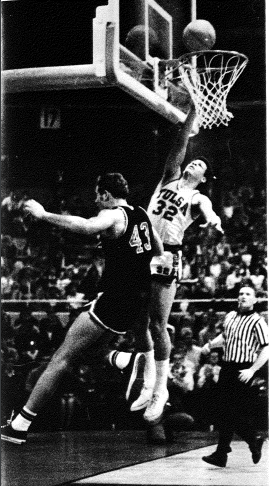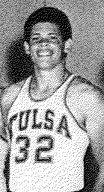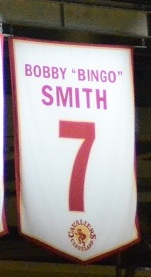1. Overview
Robert "Bingo" Smith was an American professional basketball player who spent the majority of his career with the Cleveland Cavaliers in the NBA. Known for his distinctive long-range "rainbow jumper," Smith was a key contributor to the Cavaliers during the 1970s, including their 1976 Central Division title and the memorable "Miracle at Richfield" playoff run. Drafted sixth overall in the 1969 NBA draft, he played for the San Diego Rockets, Cleveland Cavaliers, and San Diego Clippers over an 11-season career. His contributions to the Cavaliers organization are recognized by the retirement of his jersey number 7, and he is also honored by his alma mater, University of Tulsa, which retired his number 32.
2. Early Life and Background
Robert "Bingo" Smith's early life was marked by his birth in Memphis, Tennessee, and the origin of his enduring nickname during his collegiate basketball career.
2.1. Birth and Early Life
Robert Smith was born on February 26, 1946, in Memphis, Tennessee, United States. Details of his early childhood beyond his birthplace are not extensively documented, but his athletic talent became evident as he pursued basketball.
2.2. College Career
Smith played college basketball for the Tulsa Golden Hurricane at the University of Tulsa. During his senior year, he achieved impressive statistics, averaging 24.5 points and 10.3 rebounds per game. His outstanding performance earned him the title of Conference Player of the Year. It was during his time at Tulsa that he earned his famous nickname, "Bingo." The university's announcer, Len Morton, would exclaim "Bingo!" each time Smith successfully scored, a phrase that stuck with him throughout his professional career.

3. Professional Career
Robert "Bingo" Smith's professional basketball career spanned 11 seasons in the NBA, primarily with the Cleveland Cavaliers, where he established himself as a prominent scorer and a fan favorite.
3.1. NBA Draft and Entry
Smith entered the professional basketball scene as a highly regarded prospect. In the 1969 NBA draft, he was selected with the sixth overall pick in the first round by the San Diego Rockets. This marked his official entry into the National Basketball Association.
3.2. Teams and Tenure
Smith's professional journey saw him play for three different NBA franchises, though his most significant tenure was with the Cleveland Cavaliers.
3.2.1. San Diego Rockets
After being drafted by the San Diego Rockets in 1969, Smith played his inaugural NBA season with the team. In his rookie year, he appeared in 75 games, averaging 16.0 minutes, 7.3 points, and 4.4 rebounds per game.
3.2.2. Cleveland Cavaliers
A year after his debut, Smith was drafted by the Cleveland Cavaliers in the 1970 Expansion Draft, marking the beginning of his most impactful period in the league. He spent approximately nine seasons with the Cavaliers, becoming a cornerstone of the team. In his first game with the Cavaliers, he scored 21 points.
Smith was instrumental in the Cavaliers' success during the mid-1970s. He played a key role in the team winning the NBA Central Division title in 1976. He was also a vital part of the "Miracle at Richfield" team, a memorable playoff run where the Cavaliers, against expectations, defeated the Washington Bullets in Game 2 of the Semifinals. His career-high season came in 1974-75, when he averaged 15.9 points per game with a .483 field goal percentage. Smith scored his 10,000th career point in the middle of the 1979 season. He played the full 82 games in four of his seasons with the Cavaliers.
His contributions to the Cavaliers remain significant in franchise history. He ranks third all-time in games played for the Cavaliers, fifth in minutes played, and sixth in total points. He is also third in both field goals made and field goal attempts. His 9,513 points with the Cavaliers place him sixth in franchise history, and his 720 games played are the fourth-most.
3.2.3. San Diego Clippers
On October 27, 1979, Smith was traded from the Cleveland Cavaliers to the San Diego Clippers for a third-round draft pick, which was later used to select Stuart House. He played one season with the Clippers, which was notably the first year the three-point line was instituted in the NBA. After this season, he was drafted by the Dallas Mavericks in the 1980 Expansion Draft but never played for them, choosing to retire at the age of 34. His career fittingly ended in San Diego, the same city where it had begun with the Rockets.
3.3. Playing Style and Characteristics
Robert "Bingo" Smith was particularly renowned for his distinctive and effective long-range jump shot, often referred to as his "rainbow jumper." This shot, characterized by its high arc, was taken from distances that would be considered three-point range in today's game. His ability to consistently hit these outside shots made him a formidable scorer. For his career, he maintained a .449 field goal percentage (4,776 field goals made out of 10,642 attempts) and a .798 free throw percentage (1,307-of-1,637). Throughout his career, he also accumulated 3,630 total rebounds and 1,734 assists, demonstrating his all-around contribution to the game.

4. Career Statistics
Robert "Bingo" Smith's professional career statistics reflect his consistent scoring and durability over more than a decade in the NBA.
4.1. Regular Season
| Year | Team | GP | GS | MPG | FG% | 3P% | FT% | RPG | APG | SPG | BPG | PPG |
|---|---|---|---|---|---|---|---|---|---|---|---|---|
| 1969-70 | San Diego | 75 | - | 16.0 | .427 | - | .688 | 4.4 | 1.0 | 7.3 | ||
| 1970-71 | Cleveland | 77 | - | 30.3 | .448 | - | .761 | 5.6 | 3.4 | 15.2 | ||
| 1971-72 | Cleveland | 82 | - | 33.3 | .443 | - | .795 | 6.1 | 3.0 | 15.0 | ||
| 1972-73 | Cleveland | 73 | - | 14.6 | .444 | - | .790 | 2.7 | 1.5 | 8.2 | ||
| 1973-74 | Cleveland | 82 | - | 31.9 | .443 | - | .822 | 5.3 | 2.4 | 1.1 | .4 | 14.8 |
| 1974-75 | Cleveland | 82 | - | 32.1 | .483 | - | .825 | 5.0 | 2.8 | 1.0 | .3 | 15.9 |
| 1975-76 | Cleveland | 81 | - | 28.9 | .442 | - | .816 | 4.2 | 1.9 | .7 | .4 | 13.6 |
| 1976-77 | Cleveland | 81 | - | 26.4 | .446 | - | .818 | 3.9 | 1.9 | .8 | .4 | 14.5 |
| 1977-78 | Cleveland | 82 | - | 19.3 | .439 | - | .800 | 2.5 | 1.1 | .5 | .3 | 10.3 |
| 1978-79 | Cleveland | 72 | - | 22.9 | .460 | - | .783 | 2.9 | 1.7 | .6 | .1 | 11.2 |
| 1979-80 | Cleveland | 8 | - | 16.9 | .458 | .200 | .875 | 1.8 | .9 | .4 | .3 | 9.3 |
| San Diego | 70 | - | 28.4 | .430 | .289 | .869 | 3.5 | 1.3 | .8 | .2 | 11.7 | |
| Career | 865 | - | 25.9 | .449 | .284 | .798 | 4.2 | 2.0 | .8 | .3 | 12.6 | |
4.2. Playoffs
| Year | Team | GP | GS | MPG | FG% | 3P% | FT% | RPG | APG | SPG | BPG | PPG |
|---|---|---|---|---|---|---|---|---|---|---|---|---|
| 1976 | Cleveland | 13 | - | 29.2 | .433 | - | .880 | 3.3 | 2.3 | .8 | .2 | 12.6 |
| 1977 | Cleveland | 3 | - | 19.0 | .231 | - | 1.000 | 2.7 | 1.3 | 1.0 | .3 | 7.0 |
| Cleveland | 2 | - | 17.0 | .615 | - | - | 1.5 | .5 | .5 | .0 | 8.0 | |
| Career | 18 | - | 26.1 | .407 | - | .893 | 3.0 | 1.9 | .8 | .2 | 11.2 | |
5. Personal Life
Beyond his professional basketball career, Robert "Bingo" Smith also navigated significant personal challenges, including a major health event.
5.1. Family and Health
Robert "Bingo" Smith was divorced and had a large family, including five children, five grandchildren, and two great-grandchildren. On April 1, 2009, Smith suffered a stroke, a significant health event that impacted his personal life.
5.2. Death
Robert "Bingo" Smith died on October 26, 2023, at the age of 77.
6. Awards and Honors
Robert "Bingo" Smith received several significant awards and honors throughout and after his career, recognizing his impact on both collegiate and professional basketball.
6.1. Retired Numbers
Smith's jersey numbers have been retired by both his collegiate institution and his most prominent professional team. The Cleveland Cavaliers retired his number 7. This retirement was notably unique as it occurred on October 27, 1979, while Smith was still actively playing in the NBA, having been traded to the San Diego Clippers just a month prior. His college alma mater, the University of Tulsa, also honored him by retiring his number 32 in 2020.

6.2. Hall of Fame Inductions
Smith's achievements were further recognized through his induction into multiple Halls of Fame. In 1984, he was inducted into the University of Tulsa Athletics Hall of Fame. Additionally, he was a member of the 2016 class of the Ohio Basketball Hall of Fame, acknowledging his significant contributions to basketball in the state of Ohio.